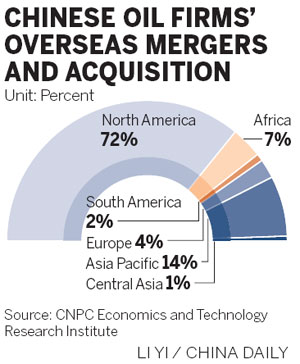CNOOC sees ink dry on Nexen deal
Updated: 2013-02-27 07:33
By Du Juan (China Daily)
|
||||||||
|
CNOOC Ltd's headquarters in Beijing. The company has signed about 200 cooperation agreements with 55 countries since 1982, helping it muster rich foreign experience. Provided to China Daily |
China's largest-ever overseas acquisition was officially completed on Tuesday, marking a major step in the country's progress in the global energy industry.
The $15.1 billion takeover by State-owned China National Offshore Oil Corporation of the Canadian oil and gas company Nexen Inc was first announced in July.
After seven months of regulatory approvals, the deal was closed at the Calgary headquarters of Nexen and confirmed by Yang Hua, the president of CNOOC.
"It is a day worth remembering," he said.
The takeover gives China's biggest offshore oil and gas explorer control of a company with assets in western Canada, the UK's North Sea, West Africa and Gulf of Mexico, as well as producing properties in the Middle East and Canada.
The acquisition will increase CNOOC's proven oil and gas reserves by 30 percent and its output by 20 percent, and provide it with valuable technology assets, especially in shale gas exploration.
But it's the assets in the North Sea which are being seen as particularly significant.

"The deal helps CNOOC participate in the North Sea oil and gas business for the first time, which is in accordance with the company's long-term strategy," said Yang.
"CNOOC has attached great importance to the North Sea region, an area that cannot be omitted by any major global oil player," he added.
"We have been waiting for the right time and the right opportunity to make our move."
In fact, the company has been paying close attention to Nexen since December 2006.
The acquisition decision was made based on CNOOC's three key evaluation standards - resources, return and risk, according to Yang.
"We need to examine the risks the company and our shareholders can stand, which is the most difficult part in balancing the timing and price of any acquisition," he said.
Lin Boqiang, director of the Xiamen-based China Center for Energy Economic Research, said the timing of the global financial crisis was a key factor in the deal being done, especially in the high-capital energy industry.
"It was bad news for the global economy, but could certainly be considered a good thing for acquirers.
"The weak global economy has provided Chinese companies with a great opportunity to buy foreign assets, allowing many to expand their overseas businesses."
Wang Yilin, the chairman of CNOOC, added that the company had acquired "a leading international platform" through the acquisition of Nexen.
He said: "We strongly believe that this acquisition is a good strategic fit for us and will create long-term value for our shareholders."
Nexen currently has 68 blocks including existing and exploration projects in the North Sea region, making it the second-largest oil producer in the area.
Besides the Buzzard oilfield, of which Nexen owns 43.2 percent of the operational rights, it also has 36.5 percent of the Golden Eagle oilfield about 69 km off the Scottish city of Aberdeen, the biggest proven reserves after Buzzard, which officials believe will contribute greatly to the sustainable output growth of the company's operations in the region.
Meanwhile, in Nigeria Nexen has 20 percent shares of large two offshore oilfields - Usan and Usan West - which both started production in 2012 with good cash flow and profitability so far.
Usan is close to the Akpo oil block of which CNOOC already owns 45 percent of the rights.

"The assets of CNOOC and Nexen complement each other, well," said Li Fanrong, the CEO of CNOOC, and the person appointed chairman of Nexen's new board of directors.
He said he believes the deal has provided a solid platform for CNOOC to expand its businesses across North America.
The company said that Kevin Reinhart, who had been serving as interim CEO of Nexen since January 2012, will remain in charge of the company.
"We want to keep all the current management staff and employees after the acquisition because they are among the most valuable assets of the company.
"Integration after the transaction will also be key to creating full value from the deal," he said.
CNOOC has been developing both domestic and overseas businesses over the past 30 years.
The company has signed about 200 cooperation agreements with 55 countries since 1982, helping it muster rich foreign experience.
With assets now in Asia, Africa, Australia and America, the company is gradually expanding its energy interests from traditional resources to unconventional resources including liquified natural gas, shale oil, shale gas and oil sands.
Through the Nexen deal, CNOOC will gain control of the massive Syncrude oil sands project in Canada, which has already been in production for 34 years.
In addition, the Chinese company will gain high-quality shale gas blocks covering 300,000 acres in Canada, a hugely significant asset for a country which already owns largest shale gas reserves but which is thirsty for acquiring share gas exploration know-how.
However, Yang said this does not mean that CNOOC will shift its shale gas development focus from China to foreign countries.
"Our overall $4 billion investment in the overseas shale gas sector over the past year is mainly market and profit-driven," he added.
According to company figures, overseas reserves accounted for 29 percent of its total by the end of 2011 and 21 percent of total output was from outside China.
"Thus, overseas assets have become an important part of the company," said Yang.
Liao Na, the vice-president of Shanghai-based energy consultancy ICIS C1 Energy, said that the Nexen deal will help CNOOC further strengthen its dominant role in offshore oil exploration, but it's the North Sea content of the deal which is particularly significant in that it will lead to China gradually increasing its participation in the international oil-pricing market, given the importance and size of its new assets in the area.
However, it will not contribute much to the weakest part of CNOOC's operations, its downstream businesses, she added.
CNOOC is not the only Chinese company that now has interests in the North Sea region, off the Scottish northeast coast.
In December, China's largest refiner China Petrochemical Corp, or Sinopec Group, acquired a 49 percent stake in the UK subsidiary of the Canada-based Talisman Energy Inc for $1.5 billion, marking its first foray into region's oil and gas business.
Talisman's UK subsidiary is headquartered in Aberdeen, and has interests in 51 oil and gas fields in the region which hold probable reserves of 489 million barrels of oil equivalent, of which 95 percent is crude oil.
Lin Boqiang said that deal will help Sinopec gain valuable offshore oil exploration experience which will improve its technology levels as it continues to compete for further interests in China's offshore oil exploration market, currently dominated by CNOOC.
Yang Hua insists Sinopec presents little threat to CNOOC, given its lead in the country's technology, services, offshore oil exploration and production sectors.
As Chinese companies have continued to expand their overseas assets, there has also been widespread opposition, especially to the ambitions of its acquisitive State-owned companies.
In December, as regulators mulled over the Nexen deal, the Canadian government released an updated foreign investment framework that established new rules for takeovers of State-owned enterprises, which served notice that no foreign takeovers of Canadian oil companies would be permitted in the future, except in "exceptional" circumstances.
However, Liao from ICIS C1 Energy said that it is inevitable that Chinese oil companies will continue to buy more overseas assets.
A recent report from accounting and consulting firm Deloitte Touche Tohmatsu shows that China's appetite for foreign energy and resource assets remains strong.
In 2005, just 10 overseas energy and resources deals were announced by China.
In 2008, that number had grown to 34, and during the first nine months of 2012, 39 such transactions were announced, it said.
Over the past year, China's outbound mergers and acquisitions reached a record high as companies and investors continued to seek opportunities abroad, especially in the energy and resources sectors.
Data from Dealogic Inc released at the end of last year showed that China's total of 35 outbound M&As in the oil and gas industry had reached $34.5 billion in value.
dujuan@chinadaily.com.cn
(China Daily 02/27/2013 page13)

 In Photos: 7.0-magnitude quake hits Sichuan
In Photos: 7.0-magnitude quake hits Sichuan
 Li Na on Time cover, makes influential 100 list
Li Na on Time cover, makes influential 100 list
 FBI releases photos of 2 Boston bombings suspects
FBI releases photos of 2 Boston bombings suspects
 World's wackiest hairstyles
World's wackiest hairstyles
 Sandstorms strike Northwest China
Sandstorms strike Northwest China
 Never-seen photos of Madonna on display
Never-seen photos of Madonna on display
 H7N9 outbreak linked to waterfowl migration
H7N9 outbreak linked to waterfowl migration
 Dozens feared dead in Texas plant blast
Dozens feared dead in Texas plant blast
Most Viewed
Editor's Picks

|

|

|

|

|

|
Today's Top News
Live report: 7.0-magnitude quake hits Sichuan, heavy casualties feared
Boston suspect cornered on boat
Cross-talk artist helps to spread the word
'Green' awareness levels drop in Beijing
Palace Museum spruces up
First couple on Time's list of most influential
H7N9 flu transmission studied
Trading channels 'need to broaden'
US Weekly

|

|








